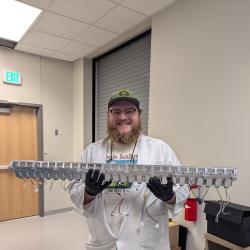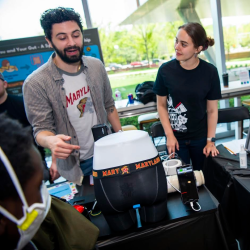UMD Professors Caren Chang and Michelle Girvan Named 2022-23 Distinguished Scholar-Teachers
The award honors faculty members who have demonstrated excellence in both teaching and research.
University of Maryland Cell Biology and Molecular Genetics Professor Caren Chang and Physics Professor Michelle Girvan have been recognized as 2022 Distinguished Scholar-Teachers.
Established in 1978, the Distinguished Scholar-Teacher Program honors faculty members who have demonstrated notable success in both scholarship and teaching. Distinguished Scholar-Teachers receive an honorarium of $5,000 to support their research and mentoring activities. Chang, Girvan and their fellow awardees will give a public lecture on a topic within their scholarly discipline during the fall semester. Chang will give her Distinguished Scholar-Teacher presentation on December 9, 2022 and Girvan will present hers on December 13, 2022.
Caren Chang
"It is rare that faculty excel at both running an internationally-recognized research program and at making innovative contributions to teaching. To do so requires true dedication, creativity, focus and intellect," said UMD Chair of Cell Biology and Molecular Genetics Kevin McIver. "Caren embodies all of these attributes in her work and is highly deserving of this prestigious award."

Since joining the UMD faculty in 1994, Chang has been at the forefront of plant signaling research. Her primary research focus is ethylene (C2H4), a colorless and faintly sweet-smelling gaseous molecule that is also a naturally occurring plant hormone. Ethylene is involved in many aspects of plant growth and development, such as fruit ripening and stress responses.
Members of her lab work to understand the role of ethylene in internal plant communication systems, which has profound implications for agriculture and industry. Recently, the team discovered that ethylene’s immediate precursor, a molecule previously not recognized beyond its role in ethylene production, is itself an independent plant signal. The lab continues to investigate the mechanisms of ethylene signaling and ethylene’s evolutionary history using a range of models including the tiny flowering plant Arabidopsis, the liverwort Marchantia and various algae.
As an educator, Chang has mentored many graduate students and postdocs, serving on approximately 90 thesis and dissertation committees. Her mission to build and strengthen scientific literacy prompted her to engage nearly 100 undergraduate and high school students in her research. Chang’s teaching links STEM coursework with hands-on, practical lab experience. She has instructed classes such as BSCI 414: Recombinant DNA Laboratory, an advanced course that offers students the opportunity to perform experiments, such as DNA cloning and PCR analysis.
Outside the lab, Chang co-directs Terrapin Teachers, a collaborative effort between the College of Education and the College of Computer, Mathematical, and Natural Sciences. The initiative is an innovative STEM education certification pathway designed to address the local and national shortage of highly skilled STEM K-12 teachers—a goal that coincides with Chang’s efforts to develop great teachers and inspire new generations of STEM scholars.
“Caren is not only a world-class scholar and leader in her research field of plant signaling, but also serves as a role model for her many trainees and junior faculty,” said Associate Professor of Cell Biology and Molecular Genetics Jiqiang (Lanny) Ling, who nominated Chang for the award. “It is truly terrific to have Caren as my colleague in the department.”
Chang earned her B.A. in biophysics from the University of California, Berkeley, in 1982 and her Ph.D. in molecular biology from Caltech in 1988.
Michelle Girvan
Girvan works in network science, which focuses on complex connectivity patterns among interacting units. This interdisciplinary field builds upon techniques from physics and applied mathematics in order to gain in new insights in systems ranging from brain networks to social networks to power grids. Girvan received her Ph.D. in physics from Cornell University and has held appointments at the Santa Fe Institute and the Institute for Advanced Study. She joined UMD's Department of Physics in 2007 and holds joint appointments in the Institute for Physical Sciences and Technology and the Institute for Research in Electronics and Applied Physics.
In 2017, Girvan received the Richard A. Ferrell Distinguished Faculty Fellowship and was elected Fellow of the American Physical Society for seminal contributions to the nonlinear and statistical physics of complex networks, including characterization of network structures and dynamics, and interdisciplinary applications. In 2020, she was elected Fellow of the Network Science Society.

Since 2016, Girvan has served as director of UMD’s COMBINE (Computation and Mathematics for Biological Networks) program, initially funded by the National Science Foundation. COMBINE’s interdisciplinary curriculum integrated quantitative modeling methods from physics and mathematics with data processing, analysis and visualization tools from computer science to gain deeper insights into living systems. Thus far, COMBINE has trained more than 60 graduate students. Early in the COVID-19 pandemic, as part of the COMBINE program, Girvan launched #Net_COVID, an online series that explored and explained network epidemiology in the time of Coronavirus.
Girvan has served as thesis advisor for 12 students in four different disciplines: physics; applied mathematics & statistics, and scientific computation; biophysics and mathemathics; she has co-advised five others (four in physics and one in chemical physics).







